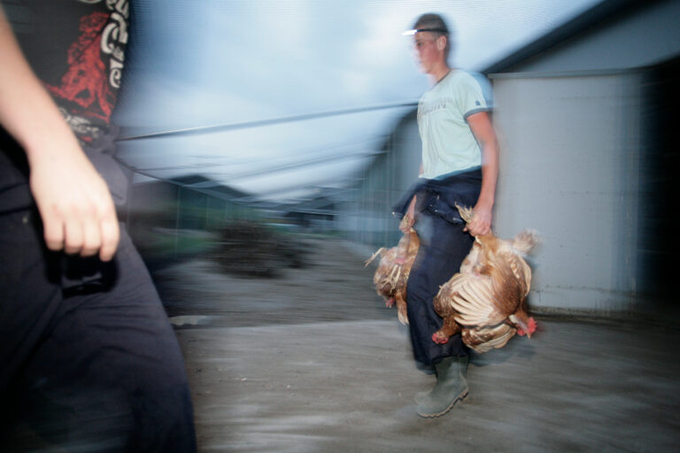November 27, 2025 | 02:38 GMT +7
November 27, 2025 | 02:38 GMT +7
Hotline: 0913.378.918
November 27, 2025 | 02:38 GMT +7
Hotline: 0913.378.918
A Flemish organisation for better animal welfare is fighting against such illegal practices.

For many years now, the European Transport Regulation forbids catching chickens by the legs. Photo: Ton Kastermans.
Poultry farmers in Flanders are still allowed to catch chicken by the legs, a practice which causes unnecessary suffering for the animals and is explicitly forbidden by the European Union.
The chickens are lifted up upside down by one leg, 3-5 animals at the time, and pushed into the crats. Millions of animals break their wings or legs and suffer from serious breathing difficulties and stress because of these practices, says the Flemish organisation for better animal welfare, Harrison Collectief. The collective of legal professionals, which started in 2023 to fight bad animal welfare practices in the country, has started a procedure at the Belgium State Council against the Inspection for Animal Welfare which, according to the Collectief, refuses to take action against the illegal practices of a number of poultry farmers.
The law is not enforced
For many years now, the European Transport Regulation forbids catching chickens by the legs. However, in Belgium there is no prosecution or sanctioning against infringements of this law. Public information shows that several companies specialised in catching chickens use these forbidden practices, according to the organisation.
The Harrison Collectief has asked the Flemish Inspectorate for Animal Welfare to take action against 3 of these companies and to sanction them. The Inspectorate has refused this request and also admitted explicitly that it doesn’t enforce the relevant law.
The Harrison Collectief stresses that judges in the Netherlands have, up to 3 times, ruled that catching chickens by the legs is forbidden. Those judgements are based on the EU Transport Regulation which also applies to Belgium. There is also a simple and animal-friendly alternative by holding the chicken straight up, the Harrison Collectief says.
“The reasons the Flemish inspectorate mentions not enforcing the rules are identical to the ones used by the Dutch authorities. The Flemish authorities say it is not the intention of the European law to forbid this method and also sums up economic reasons why a prohibition would not be desirable. Dutch courts, however, have stated clearly that those reasons are not sufficient and that the relevant authorities have to enforce the interdiction. The refusal by the Flemish Inspectorate to act is a clear infringement of the European enforcement rules,” the Harrison Collectief says. “With this procedure, we aim at a ban of this illegal catching method as well as a general improvement of the enforcement of animal welfare laws in Flanders.”
(Poultryworld)

(VAN) A new study reveals how the simultaneous effects of ocean acidification, salinity and loss of oxygen are making the world more fragile.

(VAN) Hopes are growing that the creation of the first 3D turkey gut model could be a turning point in the battle against the virulent blackhead disease.

(VAN) Tyson, America’s biggest meat supplier, plans to shutter one of its largest beef processing plants as the industry continues to struggle with low cattle supplies and political pressure from Washington.

(VAN) New FAO study shows how digital solutions are empowering farmers and fishers to prevent losses and build resilient agrifood systems.

(VAN) Brazil's COP30 presidency pushed through a compromise climate deal on Saturday that would boost finance for poor nations coping with global warming but that omitted any mention of the fossil fuels driving it.

(VAN) Poultry farmers in the UK have been warned that they could face one of the worst winters yet for bird flu.

(VAN) Prices of main-crop paddy have risen sharply, with jasmine rice hitting 16,100 baht per tonne — the highest level in years.